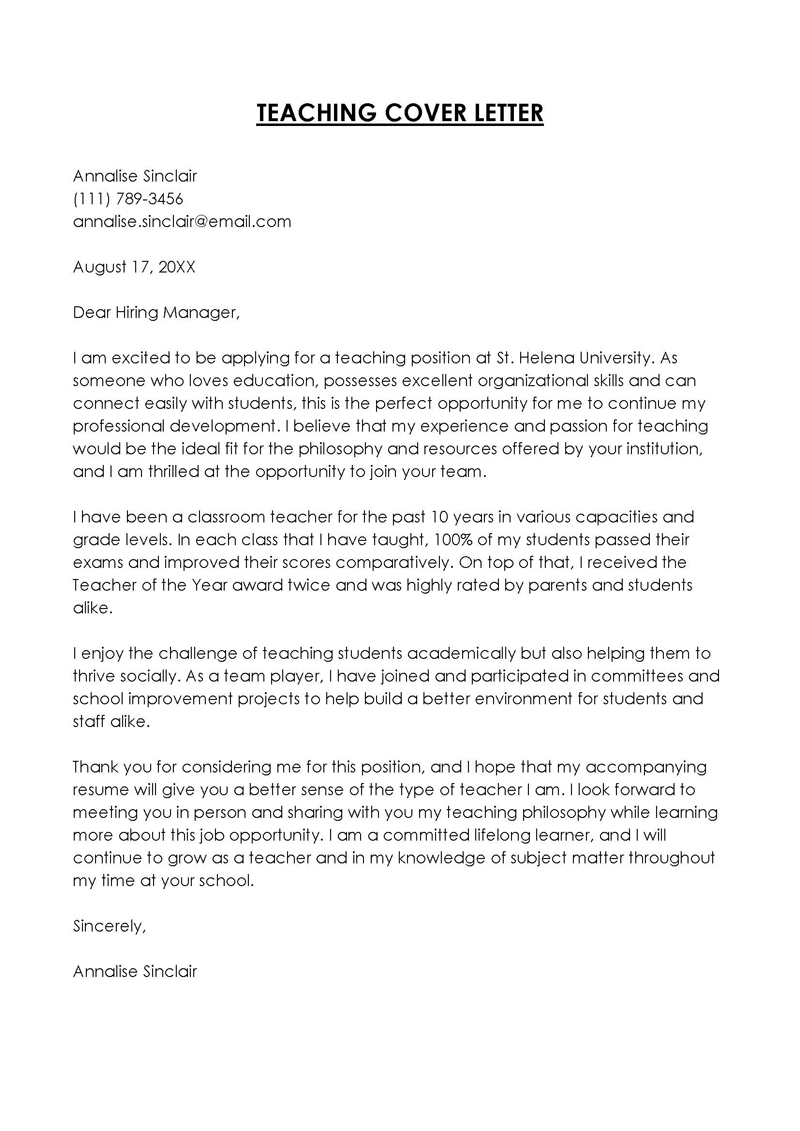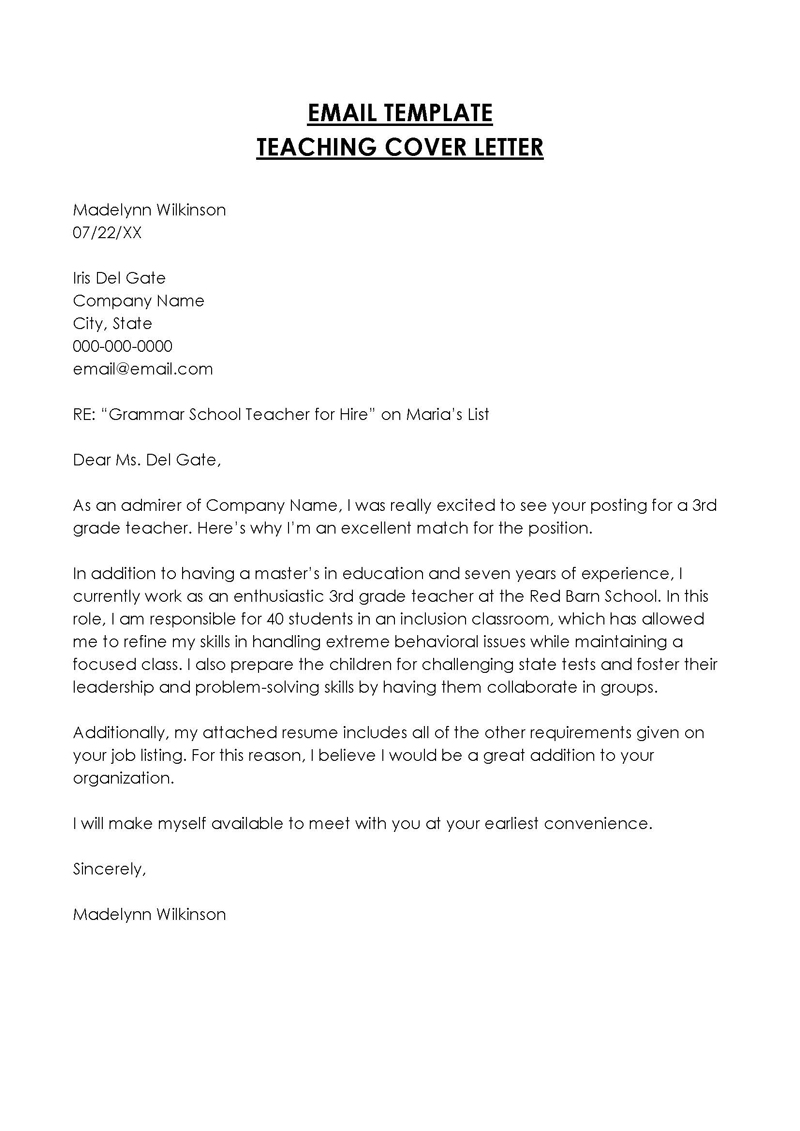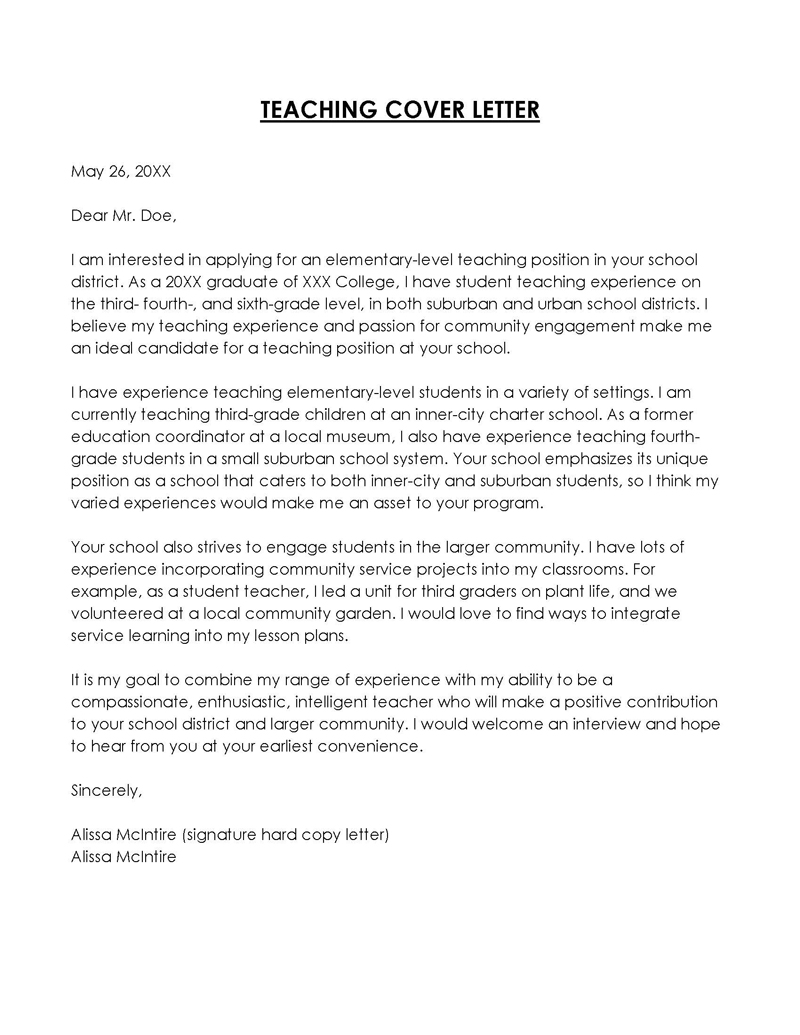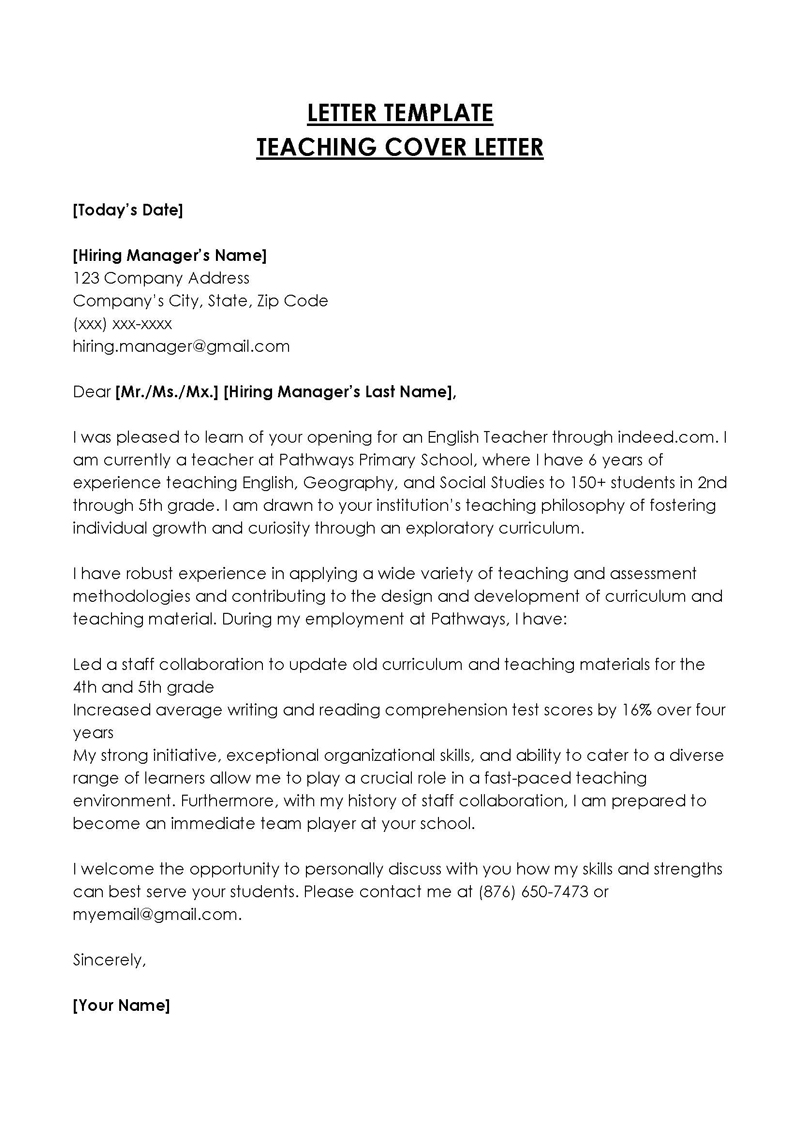A teaching cover letter is a letter that you include with your resume or curriculum vitae when applying for a job as a teacher.
When the employer receives your application for a job vacancy, the cover letter will be the first thing they see. It could be described as a preamble or an introduction. It should be written to highlight your skills and experiences while providing additional information about your teaching accomplishments.
From the perspective of a recruiter or hiring manager, a good cover letter is one that immediately draws attention to your CV. Your letter should elaborate on your qualifications, position you as being more qualified than other potential applicants, and explain what specific skills and qualifications make you the best person for the job.
It should also highlight why you are interested in the position you are applying for.
Free Templates




Why is Preliminary Research Necessary?
Applicants who extensively research the position usually receive special consideration from the hiring managers. This is beneficial because it allows you to impress the employer and demonstrates that you are committed and well-informed. Most importantly, clearly understanding your employers’ achievements helps you prepare for your future position.
EXAMPLE
If you are applying for a teaching position in a school that prioritizes inclusive education, you should discuss that in your cover letter. Briefly share your thoughts on why having equal opportunities for all children is essential. Convey your passion for teaching children with special needs and learning disabilities and explain how you would make a difference.
What Should You Include in Your Cover Letter?
If you are writing a cover letter for the first time, the following guide will help you impress every hiring manager who reads it:
Explain your motivation
Following your name, phone number, and email address, the opening paragraph of your cover letter should share your excitement about the role. This is the section where you introduce yourself as a teacher and explain why you have great respect for your vocation.
After this introductory part, which should not be longer than two sentences, you should clarify the intent and purpose of your job cover letter. Then, mention what role you are applying for and talk about it briefly to show that you understand the job description and are the right fit for it.
Show enthusiasm for the job
Most cover letters for teachers include emotionally charged language highlighting the applicant’s passion for the role. Express your excitement, but do not exaggerate it.
Sharing your genuine excitement is an excellent way to approach the hiring manager on a more personal level. For example, you can say that you are “excited to apply” or “thrilled about the opportunity.” If you have any personal links to the school or the position, feel confident about including them in your letter. For instance, if you are applying for a position at a school where you were a student, mention that.
Explain why you are a perfect match
Regardless of position, the cover letter should always help the hiring manager see the connection between an applicant’s resume and the job description. Teaching roles are no exception. It should include the following information to demonstrate that you are a suitable match.
Elaborate your experience
A mistake most applicants make when writing a cover letter is just paraphrasing critical points from their CV. There is no need to list all of your previous employers and positions. Instead, you should only mention a few significant things and elaborate on how those experiences have helped you become the teacher you are today.
For example, if you have been in education for over a few decades, you can always use that to your advantage. Talk about your perseverance, patience, and persistence. If you are inexperienced, you can convince the recruiters that this is your strength. For instance, you can say that your desire to learn and improve will motivate you to work harder.
Mention any specific training or certification
Most job descriptions have specific requirements regarding educational background, training, and certificates. However, just as you did with your experience, limit yourself to a few examples. Mention only those qualifications that make you an exemplary candidate and explain how they have contributed to improving your expertise in your job. If you have an impressive educational history and certifications, do not forget to mention them.
Quantify your achievements
Professional managers whose role is to hire new employees prefer your cover letter when you support your claims with solid facts. When listing your achievements for the cover letter, it is highly recommended to quantify them. Instead of simply stating that you have taught many students in your career, mention the number of students.
Try to mention figures and statistics when discussing your achievements as a teacher. Your students’ grades, performance in standardized tests for college entrance exams, and other assessments, for example, are all important in this regard. You should also include the number of teachers you have trained, the percentage of curriculum goals achieved, and your student retention rate in your letter.
If you have received any awards for teaching or in another field, mention that too. If you used to manage or actively participate in extracurricular activities, then you must specify the programs’ attendance, frequency, and duration of these activities.
Mention your teaching skills
Every cover letter should include a list of skills you have developed throughout the years. Remember that some skills are more valuable than others for a teaching position. For instance, a good teacher is expected to have excellent communication skills, compassion, and a strong work ethic.
Besides this, some of the soft skills you can mention are:
- Positive reinforcement
- Collaboration
- Conflict resolution
- Constructive feedback
- Critical thinking
- Decision-making
- Encouragement
- Leadership skills
- Mentorship
Here is a list of the hard skills that you can add to your cover letter for the teaching position:
- Computer literacy
- Learning management systems
- Collaboration tools
- Foreign language skills
- SMART boards
- First aid
- Knowledge of any musical instruments
- Curriculum knowledge
- Lesson planning
Mention any non-teaching work
Non-teaching work such as volunteer experience looks stellar in any cover letter, especially when real-life experience, people skills, and social responsibilities are part of the job description. However, even if your volunteer experience is not related to the position you are applying for, it still demonstrates valuable personality traits such as commitment to a cause, dedication, and teamwork. Therefore, it should also include some details about other types of work on your resume, even when they are for-profit.
Conclude with a call-to-action statement
A call-to-action statement at the end of your letter will demonstrate your enthusiasm for the job. This is the statement in which you request the hiring manager to contact you for an interview at the given number if they want. This section is necessary as it shows you are serious about the position.
Template for a Cover Letter for a Teaching Position
[Your Name]
[Your Address]
[City, State, Zip Code]
[Email Address]
[Phone Number]
[LinkedIn Profile (Optional)]
[Date]
[Principal’s/Hiring Manager’s Name]
[School/Institution Name]
[School/Institution Address]
[City, State, Zip Code]
Dear [Principal’s/Hiring Manager’s Name],
I am writing to express my interest in the [specific teaching position] at [School/Institution Name], as advertised on [where you found the job posting]. With a [Degree] in [Your Field of Study] from [Your University] and [number of years] years of experience in [teaching/educational field], I am excited about the opportunity to contribute to your team of educators. My background has equipped me with the necessary skills and knowledge to foster a positive and engaging learning environment, and I am eager to bring my passion for [Subject/Area of Teaching] to your school.
In my previous role as [Your Last Position] at [Your Last School/Institution], I successfully [describe a significant achievement, project, or initiative], which [describe the outcome or impact, e.g., “led to a 20% increase in student engagement in my classroom”]. This experience highlighted my ability to [mention any relevant skills or approaches, e.g., “create innovative lesson plans,” “utilize technology in the classroom,” “cater to diverse learning styles”].
I am particularly drawn to [School/Institution Name] because of [mention something you admire about the school, its mission, programs, or educational philosophy]. I share your commitment to [mention any relevant educational goals or principles, e.g., “holistic education,” “student-centered learning,” “STEM education”], and I am enthusiastic about the chance to contribute to [mention any specific programs, subjects, or initiatives].
My teaching philosophy centers on [briefly describe your teaching philosophy, focusing on student engagement, personalized learning, etc.]. I believe in [mention any specific teaching strategies or philosophies you prioritize, e.g., “encouraging critical thinking and problem-solving,” “building a supportive and inclusive classroom environment,” “integrating technology to enhance learning outcomes”].
I am eager to bring my [mention your strengths, e.g., “expertise,” “creativity,” “dedication”] to [School/Institution Name] and to collaborate with your team to develop engaging curricula and foster a culture of academic excellence and lifelong learning. I look forward to the opportunity to discuss how my background, skills, and enthusiasms align with the needs of your school and how I can contribute to the success of your students.
Thank you for considering my application. I am enthusiastic about the possibility of joining your esteemed faculty and am available at your convenience for an interview. I can be reached at [Your Phone Number] or [Your Email Address].
Sincerely,
[Your Name]
Sample Cover Letter Teaching
Dear Ms. Clark,
I am writing to express my enthusiasm for the Fourth Grade Teacher position at Harmony Elementary School, as advertised on the Teacherville School District website. Holding a Master’s Degree in Elementary Education from Ohio State University and possessing over five years of dedicated teaching experience, I am excited about the opportunity to contribute to your school’s renowned commitment to fostering a nurturing and innovative learning environment.
During my tenure at Bright Futures Academy, I spearheaded the integration of project-based learning into the curriculum, significantly enhancing student engagement and comprehension. This initiative not only led to a 25% improvement in standardized test scores but also cultivated a classroom atmosphere where students developed a genuine love for learning and critical thinking. My approach to education is centered on creating an inclusive classroom environment that encourages curiosity, resilience, and respect for diverse perspectives.
I am particularly drawn to Harmony Elementary School due to its emphasis on holistic child development and the integration of technology in education. I am impressed by the school’s initiatives, such as the “Tech for Tomorrow” program, which aligns perfectly with my passion for utilizing digital tools to enrich the learning experience. I am keen to bring my experience in digital literacy and interactive learning to further enhance your students’ technological fluency.
My teaching philosophy is rooted in the belief that education should empower students to discover their strengths and interests, fostering a lifelong passion for learning. I prioritize personalized instruction and collaborative projects to accommodate diverse learning styles and abilities, ensuring that each student feels valued and supported in their educational journey.
I am eager to contribute my expertise in curriculum development and my innovative teaching strategies to Harmony Elementary School. I look forward to the opportunity to collaborate with your esteemed faculty to inspire our students to achieve academic excellence and personal growth. I am confident that my proactive approach and dedication to education will make a significant impact on your school community.
Thank you for considering my application. I am enthusiastic about the prospect of joining Harmony Elementary and contributing to the continued success and development of your students. I am available at your convenience for an interview and can be reached at (614) 555-0123 or via email at adrian.smith@eduemail.com.
Sincerely,
Adrian Smith
Analysis
This letter effectively conveys the applicant’s enthusiasm and qualifications for the Fourth Grade Teacher position at Harmony Elementary School. Highlighting a Master’s Degree in Elementary Education and over five years of teaching experience, it presents a compelling case for the candidate’s suitability. The letter showcases specific achievements, such as leading project-based learning initiatives that resulted in a 25% improvement in test scores, demonstrating the applicant’s ability to enhance student engagement and academic performance. It aligns the candidate’s teaching philosophy and expertise with the school’s emphasis on holistic development and technology integration, indicating a strong match between the applicant’s values and the school’s objectives. The inclusion of personalized instruction and collaborative projects underscores the candidate’s commitment to fostering an inclusive and dynamic learning environment. The letter concludes with a clear expression of eagerness to contribute to the school community, reinforcing the applicant’s enthusiasm and readiness for the role.
Helpful Tips
The difference between a good and an ineffective cover letter is in its writing quality and how well it summarizes the applicant’s credentials. The letter should be convincing but not too long.
If you want to be noticed as the best candidate, these tips will hopefully help you:
Keep it brief
Nobody, in reality, has the time or patience to read through lengthy letters; therefore, a cover letter should not be longer than a single page. Try to be concise. Two or three paragraphs, or roughly 60 seconds of reading time, should be the ideal length. Anything longer than that is unlikely to retain the reader’s attention. Job applicants who write lengthy cover letters are usually not invited for interviews.
Ensure that the letter reflects the institute’s values
Every position, employer, and job location is different. Therefore, when applying to different schools, you must do research and learn what distinguishes each institution, then write your letter in accordance with that information. The letter should demonstrate that you understand the employer’s values and have done research on the position. Focus on how your goals align with theirs and mention the elements you like about their work culture.
Explain how the work you do can mutually benefit your future and the requirements of your prospective employer. You can demonstrate in this section of your cover letter that you are qualified for the position and that you will also contribute positively to the team and the workplace, in addition to being able to perform the job well. This is necessary if you want to prove that you are the right match for the job posting.
Customize your letter to the job posting
Learning about the employer and the role before applying is essential because you want your cover letter to align with their values. If you use some of the keywords listed in the job description, your chances of getting an interview will also increase. These keywords are the requirements and skills the employer expects to see in your cover letter and CV.
Invest time and effort in writing
You cannot expect the hiring manager to give your application serious consideration if your cover letter does not demonstrate that you have invested some time and thought into writing each part. A cover letter that is dull, impersonal, and poorly phrased does not present you as a diligent and committed candidate for the job. Thus, research the employer and job description thoroughly and draft your cover letter accordingly.
Proofread your letter
Misspelled words, grammatical errors, and incomplete sentences in a cover letter are unacceptable in any situation, particularly when applying for a teaching position. Therefore, before you send your cover letter, proofread it thoroughly for any errors.
Key Takeaways
- Your chances of getting a job with a reputable employer depend heavily on your cover letter.
- Carefully drafted cover letters help prospective candidates share their working experiences and examples that show they are the most qualified for the job.
- It is a unique opportunity to showcase your skills and how you plan to apply them in a specific teaching scenario.
- The best cover letters are authentic and convey a candidate’s enthusiasm for the role and passion for teaching.
- When reading letters for teaching roles, hiring managers expect to be impressed by your educational qualifications, determination, and commitment. This is especially important if you have limited experience with few quantifiable achievements.
- Personalizing your letter to the institution and the role you want to be considered for will give you some advantage over other candidates.
- A letter that shows that you have put effort and thought into writing indicates that you take an opportunity seriously.












